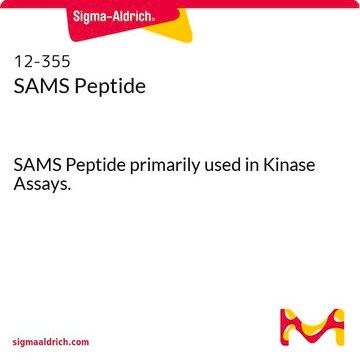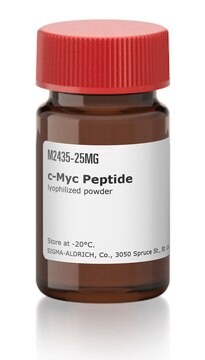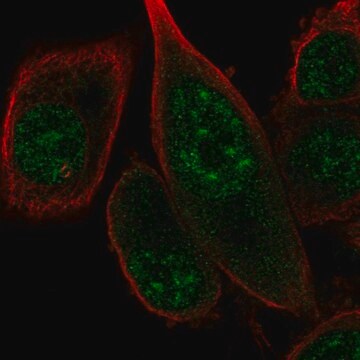208902
Calpastatin Peptide
A 27-amino acid, cell-permeable peptide encoded by exon 1B of human calpastatin that acts as a potent inhibitor of calpain I and calpain II (IC₅₀ = 20 nM for purified rabbit calpain II).
Synonym(s):
Calpastatin Peptide, CS Peptide
Sign Into View Organizational & Contract Pricing
All Photos(1)
About This Item
Empirical Formula (Hill Notation):
C142H230N36O44S
Molecular Weight:
3177.63
UNSPSC Code:
12352202
NACRES:
NA.77
Recommended Products
Quality Level
Assay
≥95% (HPLC)
form
lyophilized solid
manufacturer/tradename
Calbiochem®
storage condition
OK to freeze
desiccated (hygroscopic)
color
white
solubility
1% acetic acid: 1 mg/mL
water: 1 mg/mL
shipped in
ambient
storage temp.
−20°C
General description
A 27-amino acid, cell-permeable peptide encoded by exon 1B of human calpastatin that acts as a potent inhibitor of calpain I and calpain II (IC50 = 20 nM for purified rabbit calpain II). Does not inhibit either papain or trypsin. Blocks the down-regulation of protein kinase Cε (PKCε) in rat pituitary GH4C1 cells stimulated by thyrotropin-releasing hormone (TRH).
A 27-amino acid, peptide encoded by exon 1B of human calpastatin that acts as a cell-permeable and potent inhibitor of calpain I and calpain II (IC50 = 20 nM for purified rabbit calpain II). Does not inhibit either papain or trypsin. Blocks the down-regulation of protein kinase Cε (PKCε) in rat pituitary GH4C1 cells stimulated by thyrotropin-releasing hormone (TRH).
Biochem/physiol Actions
Cell permeable: yes
Primary Target
calpain 2
calpain 2
Product does not compete with ATP.
Reversible: no
Target IC50: 20 nM against calpain II
Warning
Toxicity: Standard Handling (A)
Sequence
Ac-Asp-Pro-Met-Ser-Ser-Thr-Tyr-Ile-Glu-Glu-Leu-Gly-Lys-Arg-Glu-Val-Thr-Ile-Pro-Pro-Lys-Tyr-Arg-Glu-Leu-Leu-Ala-NH₂
Physical form
Supplied as a trifluoroacetate salt.
Reconstitution
Following reconstitution, aliquot and freeze (-20°C). Stock solutions are stable for up to 3 months at -20°C.
Other Notes
Eto, A., et al. 1995. J. Biol. Chem. 270, 25115.
Kawasaki, J., et al. 1989. J. Biochem. 106, 274.
Maki, M., et al. 1989. J. Biol. Chem. 264, 18866.
Kawasaki, J., et al. 1989. J. Biochem. 106, 274.
Maki, M., et al. 1989. J. Biol. Chem. 264, 18866.
Legal Information
CALBIOCHEM is a registered trademark of Merck KGaA, Darmstadt, Germany
Storage Class Code
11 - Combustible Solids
WGK
WGK 1
Flash Point(F)
Not applicable
Flash Point(C)
Not applicable
Certificates of Analysis (COA)
Search for Certificates of Analysis (COA) by entering the products Lot/Batch Number. Lot and Batch Numbers can be found on a product’s label following the words ‘Lot’ or ‘Batch’.
Already Own This Product?
Find documentation for the products that you have recently purchased in the Document Library.
Xianliang Zeng et al.
Oncology letters, 21(2), 124-124 (2021-02-09)
Cancer cachexia is a life-threatening syndrome characterized by muscle atrophy. Cancer cachectic muscle atrophy (CCMA) is associated with mitochondrial injury. Mitochondrial calpains have been reported to induce mitochondrial injury in mouse cardiomyocytes and pulmonary smooth muscle. In the present study
Li Huang et al.
International journal of molecular sciences, 22(12) (2021-07-03)
Retinitis pigmentosa (RP) is an inherited form of retinal degeneration characterized by primary rod photoreceptor cell death followed by cone loss. Mutations in several genes linked to the disease cause increased levels of cyclic guanosine monophosphate (cGMP) and calcium ion
Our team of scientists has experience in all areas of research including Life Science, Material Science, Chemical Synthesis, Chromatography, Analytical and many others.
Contact Technical Service








